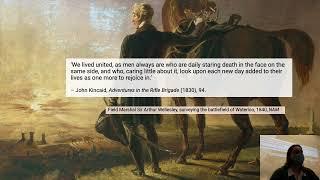
Matilda Greig, Dead Men Telling Tales:Napoleonic War Veterans&the Military Memoir Industry,1808-1914
Matilda Greig (Universitat Pompeu Fabra, Barcelone), autour de son livre, Dead Men Telling Tales: Napoleonic War Veterans and the Military Memoir Industry, 1808-1914 (Oxford, 2021)
As Napoleon’s wars drew to a close in 1815, a series of ripples flowed out into the publishing world. Veterans of the different campaigns had begun releasing memoirs of their experiences, in greater numbers than ever before, and with the help of descendants, publishers and translators, the tide would continue until well into the twentieth century. In this discussion of my book, Dead Men Telling Tales: Napoleonic War Veterans and the Military Memoir Industry, 1808-1914 (Oxford University Press, 2021), I explore the impact these personal stories had upon the history and representation of this period. Taking the Peninsular War as my case study, I show how the ‘soldier’s tale’ evolved differently in Spain versus France and Britain, how national histories of the same war remained starkly opposing over time, and how veterans themselves played an active role in the publication of their work. I conclude by considering the ironic legacy these books and their lasting commercial success left for the First World War generation – a myth of war as a positive, exciting and masculine experience, where quick victory was possible and glory could be won.
As Napoleon’s wars drew to a close in 1815, a series of ripples flowed out into the publishing world. Veterans of the different campaigns had begun releasing memoirs of their experiences, in greater numbers than ever before, and with the help of descendants, publishers and translators, the tide would continue until well into the twentieth century. In this discussion of my book, Dead Men Telling Tales: Napoleonic War Veterans and the Military Memoir Industry, 1808-1914 (Oxford University Press, 2021), I explore the impact these personal stories had upon the history and representation of this period. Taking the Peninsular War as my case study, I show how the ‘soldier’s tale’ evolved differently in Spain versus France and Britain, how national histories of the same war remained starkly opposing over time, and how veterans themselves played an active role in the publication of their work. I conclude by considering the ironic legacy these books and their lasting commercial success left for the First World War generation – a myth of war as a positive, exciting and masculine experience, where quick victory was possible and glory could be won.
Комментарии:
Matilda Greig, Dead Men Telling Tales:Napoleonic War Veterans&the Military Memoir Industry,1808-1914
Séminaire franco-britannique d'histoire
2023 Keeway RKV125 UK Review
Motors for the Masses
ПРОХОЖДЕНИЕ THE CALLISTO PROTOCOL | 3 ЧАСТЬ [2K | 60FPS]
StyleMarlboroRed
Honda XR 190 L - Solo le Falta esto
Motos Fly Pasión
Audrey Tautou - First U.S. interview
vegastiki
NME6 - TEASER 1
STEFAN BARNICHE
The Spandakarika - "Song of the Sacred Tremor" - Kashmir Shaivism
Samaneri Jayasāra - Wisdom of the Masters



![ПРОХОЖДЕНИЕ THE CALLISTO PROTOCOL | 3 ЧАСТЬ [2K | 60FPS] ПРОХОЖДЕНИЕ THE CALLISTO PROTOCOL | 3 ЧАСТЬ [2K | 60FPS]](https://rtube.cc/img/upload/a1JHalZtY0p4aHM.jpg)






















